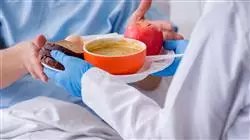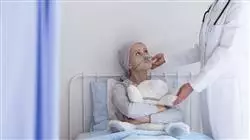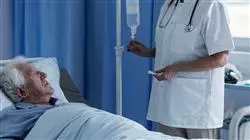University certificate
The world's largest faculty of nursing”
Description
A complete qualification that will help you to learn the main tools and innovations in nutrition in the field of oncology”

Nurses are the main professionals who provide care to oncology patients. Within their scope of action, nutrition is an essential pillar, both in the prevention and treatment of cancer, so it is essential that the student acquires complete and up to date knowledge on the nutritional approach to the oncology patient. Malnutrition is a frequent problem that causes a large number of complications in cancer patients, reducing their quality of life and worsening their general condition. For this reason, it is essential to know the causes and factors involved and to detect early the clinical manifestations of these patients in order to provide the appropriate care and nutritional support.
In their last moments, the patient presents a characteristic symptomatology, with specific needs that must be known and learned to address. This program will provide students with the necessary tools to detect the most common signs and symptoms at this stage of the disease, as well as strategies to provide the most appropriate treatment and alleviate suffering at this time of life.
In this way, TECH has designed the update of the contents of this postgraduate diploma with an integrative approach that will result in a complete vision of all aspects related to oncology nursing. The elaborate syllabus will provide a journey through the diverse needs of cancer patients, whose particularities require personalized attention.
Both the design of the program and the educational material used will facilitate the understanding of concepts, and the realization of practical cases will help to adapt what has been learned to daily practice. In this way, the completion of the postgraduate diploma will provide immersive learning to achieve the professional's specialization in real situations of their usual professional practice.
Don’t miss this opportunity to study in the biggest private online university”
This postgraduate diploma in Oncology Patient Care. Nutrition and Nursing Communication contains the most complete and up-to-date scientific program on the market. The most important features include:
- The development of case studies presented by experts in Oncology Nursing
- The graphic, schematic, and practical contents with which they are created, provide scientific and practical information on the disciplines that are essential for professional practice
- What's new in oncology nursing: tumor types, oncology treatment and administration
- Practical exercises where self-assessment can be used to improve learning
- Special emphasis on innovative methodologies in Oncology Nursing
- Theoretical lessons, questions to the expert, debate forums on controversial topics, and individual reflection assignments
- Content that is accessible from any fixed or portable device with an Internet connection
This postgraduate diploma is the best investment you can make in selecting a refresher program to update your knowledge in Oncology Nursing”
Its teaching staff includes professionals from the field of nursing Dermatology, who bring their experience to this Postgraduate Diploma program, as well as renowned specialists from leading communities and prestigious universities.
The multimedia content, developed with the latest educational technology, will provide the professional with situated and contextual learning, i.e., a simulated environment that will provide immersive learning programmed to study in real situations.
The design of this program focuses on Problem-Based Learning, by means of which the specialist must try to solve the different professional practice situations that arise throughout the program. To do so, they will be assisted by an innovative interactive video system created by recognized experts in the Oncology Nursing with extensive experience.
The best teaching material in a high-quality program that will facilitate your learning in a contextual approach"

This 100% online postgraduate diploma will allow you to balance your studies with your professional work while expanding your knowledge in this field"
Objectives
This postgraduate diploma in Oncology Patient Care. Nutrition and Nursing Communication is oriented to specialize health professionals in their daily work during the care of cancer patients, following the highest quality standards in the performance of their work.
Our goal is to help you achieve the skills of a professional of proven excellence in your profession”
General Objectives
- Expand the professional's knowledge, facilitating the acquisition of advanced competencies that will enable them to provide specialized care to complex oncology patients
- Incorporate theoretical and pathophysiological fundamentals in nursing practice, assuming the particularities of pediatric, adult and elderly patients
- Define the specific competencies of the nurse in the oncology setting to increase effectiveness and efficiency in the organization and acquire skills in coordination and management of the nursing team
- Design patient and family care plans integrating knowledge, attitudes and skills acquired during the Postgraduate Diploma
- Apply the theoretical knowledge acquired in relation to the oncology patient and the management and administration of treatment, guaranteeing patient safety at all times
- Delve into the development of interpersonal relationships between the professional and the patient-family, as well as with the rest of the members of the multidisciplinary team
- Integrate emotional management strategies in the different stages of the disease process, incorporating the psychosocial and spiritual approach in the care and assuming death as a natural process in the terminal patient
- Acquire the necessary specialization to act with autonomy and provide the best care based on scientific evidence
- Implement research into routine nursing practice as a basis for professional development and effective and efficient management of complex cases
Specific Objectives
Module 1. Nursing Approach to Nutrition and Post-Surgical Care of the Oncology Patient
- Deepen in the relationship between nutrition and cancer
- Determine the pathophysiological basis of oncologic malnutrition and its causes
- Acquire the necessary knowledge to assess the nutritional status of the oncologic patient and prevent possible complications
- Identify the nutritional needs of the oncology patient and their approach
- Develop skills to perform a nutritional and pharmacological therapeutic approach in cases of altered intake
- Update the aspects related to the indications, access routes and complications of artificial nutrition (enteral and parenteral)
- Assess the nutritional needs of terminal patients and address them from an ethical perspective
- Describe the postsurgical care of the most frequent types of cancer
- Put into practice the techniques and nursing care in pulmonary rehabilitation and respiratory physiotherapy
- Recognize the different types of ostomies and their characteristics to provide quality care to the ostomized patient
- Demonstrate competence in the correct management of lymphedema as a complication of breast surgery
Module 2. Nursing care in the palliative and terminal patient.
- Recognize the importance of palliative care and know its historical background
- Frame the palliative patient and his care within the state regulations, knowing his rights
- Identify the signs and symptoms that appear in the oncology patient at the end of life and know how to treat them to provide the greatest comfort and well-being
- Detect the patient's needs in the last days of life in order to provide comprehensive and quality care
- Develop skills to provide emotional and psychological support to the patient's family environment in times of agony
- Become familiar with the end-of-life process at home, as well as its historical background
- Distinguish the types of grief and its phases
- Design nursing care plans for family members going through the stages of bereavement
- Understand the different areas covered by bioethics in palliative care
- Develop care plans through the nursing care process including diagnoses (NANDA), objectives (NOC) and interventions (NIC)
Module 3. Communication and psychosocial approach to the oncology patient in nursing
- Communicate in an understandable way, appropriate to the patient's needs and providing true information that helps decision
- Develop assertive communication and self-regulation skills, as well as problem analysis and resolution techniques
- Facilitate the adaptation process and motivate patients with maladaptive denial to change
- Implement the phases of the deliberative process as a strategy to guide the patient in making decisions about their own health.
- Manage the appearance of the conspiracy of silence through emotional validation, empathy, anticipation or agreement
- Assess the patient's decision-making capacity and identify the non-competent patient
- Recognize the external, internal and learning factors involved in the appearance of aggressiveness in the oncology patient
- Support and evaluate the emotional reactions derived from the possibility of limiting the therapeutic effort
- Anticipate and prevent family breakdown by identifying related factors and developing family intervention strategies
- Identify manifestations and risk indicators of complicated grief and implement family support techniques
- Guide the patient and family in advance planning for health care decisions
Module 4. Oncology Nursing in the pediatric and elderly patient.
- Determine the prevalence of cancer in pediatric age and become familiar with the most frequent tumors
- Describe the main treatments in children and adolescent patients, as well as their possible complications
- Identify the needs of the pediatric cancer patient and their family environment from a holistic perspective to provide quality care
- Develop skills to care for the pediatric patient in the last days of life, providing psychological and emotional support
- Assess the nutritional status of the pediatric patient and adapt nutrition to reduce complications and increase quality of life
- Provide psychological care to the patient and their environment during the different stages of the disease that favors an effective adaptation and improves their wellbeing
- Describe the most frequent tumors in the elderly population
- Know the specific characteristics of the elderly population and their influence on neoplastic diseases
- Acquire the knowledge necessary to perform a comprehensive geriatric assessment and identify the patient's needs in order to develop a therapeutic plan
- Review the fundamental aspects of oncologic pain in the elderly patient and its multidimensional approach

Make the most of this opportunity and take the next step to get up to date on the latest developments in Oncology Patient Care. Nutrition and Nursing Communication”
Postgraduate Diploma in Oncology Patient Care. Nutrition and Communication for Nursing
Oncology patient care is mainly provided by nurses, who have a crucial role in the field of nutrition, helping to complement the treatment of cancer. Thus, it is necessary to detect early the clinical manifestations presented by these individuals in order to provide them with adequate nutritional support. For this, it is essential that these professionals are kept up to date with respect to the nutritional approach of the oncology patient. As a result, TECH has developed the Postgraduate Diploma in Oncology Patient Care. Nutrition and Communication for Nursing, a program that will provide you with the most cutting-edge knowledge in this field. Thus, once you have completed the program, you will be able to perfect the nutritional care of patients suffering from this type of disease.
Get your desired health update with this program.
In this program, you will learn cutting-edge methods to detect the most common signs and symptoms of inadequate nutrition in cancer patients, you will learn techniques to analyze their nutritional requirements, and you will acquire the best communication methods to help them overcome their illness with positivity. The design of the didactic materials of the Postgraduate Diploma in Oncology Patient Care. Nutrition and Communication for Nursing has been designed to facilitate the understanding of the concepts, while the elaboration of practical cases will allow you to adapt what you have learned to real situations in your professional practice. In this way, completing this program will provide an immersive experience that will enable you to update yourself with full solvency.







